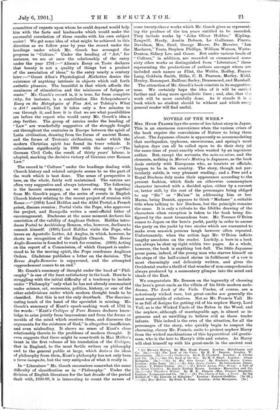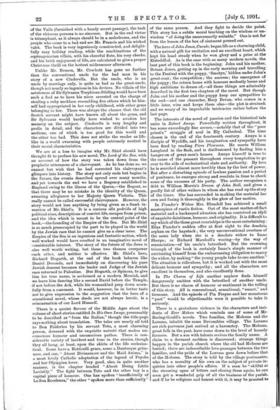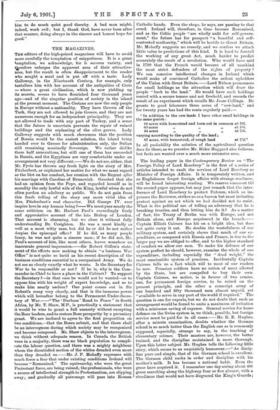NOVELS OF THE WEEK.*
MRS. HUGH FRASER lays the scene of her latest story in Japan. This is an enormous convenience when the various crises of the book require the convulsions of Nature to bring them about. The Japanese climate is apparently so accommodating that earthquakes, typhoons, snowstorms, and spring's most halcyon days can all be called upon to do their duty (at the same time of year) exactly when wanted by an ingenious author. But, except the servants, the mise-en-scene, and the elements, nothing in Marna's Mutiny is Japanese, as the book deals entirely with Europeans who, as tourists or officials, happen to be in the country. The story, though not par- ticularly subtle, is very pleasant reading; and a Peer and a Royal Duchess duly make their appearance according to the present fashion, which finds an otherwise commonplace character invested with a decided spice, either by a coronet or, better still, by the rest of the personages being obliged to say " Sir " or " Ma'am " in addressing him or her. Mania, being Danish, appears to think " Madame" a suitable title when talking to her Duchess, but the principle remains the same. It is only a tribute to the lifelike drawing of the characters when exception is taken to the book being dis- figured by the most tremendous bore. Mr. Terence O'Brien comes to Japan on the hero's yacht, partly in order to amuse the party on the yacht by two stories which are warranted to
even sea-sick persons laugh however often repeated.. Unfortunately, when the action lags Mr. O'Brien inflicts-, lengthy anecdotes on the reader. Luckily, a bore in a book can always be shut up tight within two pages. As a whole, however, the book is anything but dull. The little Japanese- prose poem, indeed, of the young man who starves himself on' the steps of the half-ruined shrine in fulfilment of a vow is most charmingly and delicately written, and gives the- Occidental reader a thrill of that wonder of non-comprehension always produced by a momentary glimpse into the mind and ideals of the East.
We congratulate Mr. Benson on the ingenuity of choosing- the hero's great-uncle as the villain of his little modern melo- drama, The Luck of the Vails. Uncles, of course, are a notoriously wicked race, but great-uncles are generally the most respectable of relatives. Not so Mr. Francis Vail. He is as full of designs for getting rid of his nephew Harry, Lord Vail, as is the Wicked Uncle of the Babes in the Wood, and the nephew, although of marriageable age, is almost as in- genuous and as unwilling to believe evil as those tender infants. This indeed is the crux of the situation, for all the personages of the story, who quickly begin to suspect the charming, cheery Mr. Francis, unite to protect nephew Harry from the wicked machinations of this hypocritical old gentle- man, who is the heir to Harry's title and estates. As Harry will shut himself up with his great-uncle in the ancient seat • (1.) Marna's Mutiny. By Mrs. Hugh Fraser. London : Hutchinson and Co. [6s.]—(2.) The Luck of the Volts. By E. F. Benson. London : W. Heinemann. [6s.]—(3.) Cinderella. By S. R. Crockett. London J. Clarke and Co. [6s.3—(4.) The Lord of the Sea. By 3t. P. Shiel. London : Grant Richards. [6s.]—(5.) In His Oust linage. By Frederic, Baron Corvo. London : John Lone. [6s.]—(6.) John Jones, Curate. By Gwendolen Pryce. London : T. Fisher Unwin. 16s.]—(7.) Robert Annys. Poor Priest : a Tale of the Great Uprising. By Annie Nathan Meyer. London : Macmillan and Co. [6s.]—(S.) Piander's Widow. By IL E. Francis (Mrs. Francis Blundell). Undon Longmaus and Co. [6s.]—(9.) The Churns of Life a Novel. By the Author of " An Episode at Schmeks.' London Francis Griffiths. [Ss. ed.] —(10.) Ever Ifohun. By Fred. T. Jane. London John Macqueen. Psi of the Vails (furnished with a handy secret passage), the task of the virtuous persons is no sinecure. But in the end virtue is triumphant, as it always should be in a melodrama, and the people who come to a bad end are Mr. Francis and his wicked valet. The book is very ingeniously constructed, and delight- fully easy holiday reading, while the machinations of the septuagenarian villain, with his cheerful flute, his rosy cheeks, and his brisk enjoyment of life, are calculated to give a proper Christmas thrill on the hottest midsummer afternoon.
Unlike Mr. Benson, Mr. Crockett has gone no further than the conventional uncle for the bad man in his story of a new Cinderella. But the uncle, who is an uncle by marriage only, is quite as bad as the great-uncle, though not nearly so ingenious in his devices. No villain of the astuteness of Sir Sylvanus Torphican-Stirling would have been such a fool as to have his niece arrested on the charge of stealing a ruby necklace resembling five others which he him- self had appropriated in her early childhood, with other gems belonging to her. There was always the chance that the old Scotch servant might have known all about the gems, and Sir Sylvanus would hardly have wished to awaken her memory on the subject. Cinderella is very lengthy and prolix in detail, and the characters are divided into two sections, one of which is too good for this world and the other too bad. This does not strike the reader as life- like in a world swarming with people extremely neutral in their moral characteristics.
We are at a loss to imagine why Mr. Shiel should have thought fit to preface his new novel, The Lord of the Sea, with an account of how the story was taken down from the prophetic utterances of a clairvoyant. As he has done so, we -cannot but wish that he had corrected his clairvoyant's glimpses into history. The story not only ends but begins in the future, the events described spread over many months, .and yet towards the end we have a Regency established in -England owing to the illness of the Queen,—the Regent, so that there may be no mistake in the identity of the Queen, swearing allegiance to her Majesty Queen Victoria. This really cannot be called successful clairvoyance. However, the story would not lose anything by being given as a frank in- vention of Mr. Shiel's. It is a curious olla podrida of high political aims, descriptions of convict life, escapes from prison, and the idea which is meant to be the central point of the book,—the founding of the Empire of the Sea. But Mr. Shiel is so much preoccupied by the part to be played in the world by the Jewish race that he cannot give us a clear issue. The Empire of the Sea is an ingenious and fantastic notion, which well worked would have resulted in an imaginative novel of considerable interest. The story of the future of the Jews is also well worth writing, but these two themes overpower each other, and neither is effective. Mr. Shiel's hero, Richard Hogarth, at the end of the • book behaves like Daniel Deronda, and immediately on discovering his pure Jewish descent becomes the leader and Judge of the Jewish race returned to Palestine. But Hogarth, or Spinoza, to give him his true name, is acclaimed as a modern Messiah, and we leave him dancing like a second David before the Temple, if not before the Ark, while his womankind peep down scorn- fully from a casement. It would, however, be in better taste not-to give expression to the suggestion that the hero of a sensational novel, whose deeds are not always heroic, is a reincarnation of our Lord Himself.
There is a quaint flavour of the Middle Ages about the volume of short stories entitled In His Own Image, presumably to be described as " from the Italian," though the title-page says nothing about translation. The tales are nearly all told to Don Friderico by his servant Toto, a most charming person, dowered with the exquisite naivete that makes un- conscious humour and unconscious pathos. There is con- siderable variety of incident and tone in the stories, though they all hang, at least, upon the skirts of the life ecclesias- tical Some have a Botticelli grace, some a Dantesque grim- ness, and one, " About Divinamore and the Maid Anima," is a most lovely Catholic adaptatiop of the legend of Psyche and her Olympian lover. Very good, also, in quite another manner, is the chapter headed "About Doing Little Lavishly." The fight between Toto and the other boy is a capital piece of humour. One has spoken " insufficiently of La Sua Eccelenza," the other " spoken more than sufficiently"
of the same person. And they fight to decide the point.' This story has a subtle moral teaching on the wisdom or un- wisdom "of doing the unnecessarily suitable." One is not far from the lesson of the box of ointment poured out.
The hero of John Jones, Curate, began life as a charming child, with a natural gift for recitation and an excellent heart, which
kept his head steady when he won glory and a prize at the Eisteddfod. As is the case with so many modern novels, the best part of this book is the beginning. John and his mother, Betsan Jones, getting up in the early morning and travelling to the Festival with the puppy, Smotyn,' hidden under John's great-coat; the competition ; the success ; the emergence of the puppy; the return home with honours modestly borne and high ambitions to dream of,—all these things are admirably described in the first two chapters of the novel But though John and his mother and the puppy keep our sympathies to the end—and one character, Mary Bevan, who comes in a little later, wins and keeps them also—the plot is strained, and we weary of its improbable intricacies rather before the last page.
The interests of the novel of passion and the historical tale unite in Robert Annys. Powerfully written throughout, it has some exceedingly fine scenes,—notably that of the "poor priest's" struggle of soul in Ely Cathedral. The time chosen is the end of the fourteenth century. Annys is a disciple of Wycliffe, and his imagination and sympathy have been fired by reading Piers Plowman. He meets William Langland in the flesh, and is disillusioned by finding him a hanger-on of great men's houses. Annys himself is true to the cause of the peasant throughout every temptation to go over to the side of ecclesiastical state and authority. By love he is searched almost more terribly than by the lust of power. But after a disturbing episode of lawless passion and a period of penitence, he emerges strong and resolute in time to check some of the excesses of his party. The author recognises a debt to William Morris's Dream of John Ball, and gives a goodly list of other writers in whom she has read up the story of the times. She has succeeded in making the material her own and fusing it thoroughly in the glow of her motive.
In Fiander's Widow Mrs. Blundell has achieved a small masterpiece of rustic fiction. Out of the most matter-of-fact material and a hackneyed situation she has contrived an idyll of exquisite daintiness, humour, and originality. It is difficult to say which of the three great courtships is the most entertaining : Elias Fiander's sudden offer at first sight to the desolate orphan on the haystack ; the very unconventional Overture of the same lady when she is a desolate widow to Isaac Sharpe ; or Richard Marshall's wooing—by the way of renunciation—of his uncle's betrothed. But the crowning triumph of the book is certainly Isaac's simple manner of extricating himself from the embarrassing obligation to marry the widow, by making " the young people take to one another." The situation is ridiculous, but it is worked out with the most delicate humour and sympathy; and all the characters are excellent in themselves, and also excellently done.
In The Charm of Life another nephew finds himself dangerously smitten with the betrothed of another uncle. But there is no charm of humour or sentiment in the telling of this story. All is conventional, sensational, "smart," and tiresome. And the episode of Pia Freyne and her monstrous "past" would be objeCtionable were it possible to take it seriously.
There is a gratuitous violence in the, characters and inci- dents of Ever Mohun which reminds one of some of Mr- Baring-Gonld's novels. Two families, the Mohuns and the Lorams, inhabit the same Devonshire village. The Loranis are rich parvenus just arrived at a baronetcy. The Mohuns, great folk in the past, have come down to the level of homely farmers. But a son with talents revives the family name. A claim to a dormant earldom is discovered; strange things happen in the parish church where the old bad Mohuns are buried; there are indescribable lova-pasaages between the two families, and the pride of the Lorams goes down before that of the Mohuns. The story is told by the village postmaster, who has a morality of his own on the subject of private in- quiries into other people's affairs. If a man be " skilful at the steaming open of letters and closing them again, he can aeon get a wonderful grip of all the business of the parish, and if he be religious and honest with it, it may be granted to
him to do much quiet good thereby. A bad man might, indeed, work evil ; but I, thank God, have never been after that manner, doing always in the sincere and honest hope for good."




















































 Previous page
Previous page